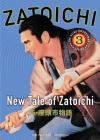| Reviews & Columns |
|
Reviews DVD TV on DVD Blu-ray 4K UHD International DVDs In Theaters Reviews by Studio Video Games Features Collector Series DVDs Easter Egg Database Interviews DVD Talk Radio Feature Articles Columns Anime Talk DVD Savant Horror DVDs The M.O.D. Squad Art House HD Talk Silent DVD
|
DVD Talk Forum |
|
|
| Resources |
|
DVD Price Search Customer Service #'s RCE Info Links |
|
Columns
|
|
|
Zatoichi the Blind Swordsman, Vol. 3 - New Tale of Zatoichi
After running into an old friend and aiding fellow travelers at an inn by tracking down the men that robbed them, Ichi begins to reflect on his violent ways and the mounting grudges and bounties on his head. He returns to his hometown, reuniting with his sensei, Banno, and Banno's sister Yayoi, and pauses to take a breath and reassess his life. But, a gang of thieves, the Tengu Gang, has been terrorizing the area. Ichi is overwhelmed when Yayoi, despite her brothers plans to marry her off to a respected man, professes her love for the scoundrel blind masseur. Ichi pleads to resign his rough way of life for her, but his old life is not so easily left behind as a vengeance seeking brother tracks him down and Banno refuses that his sister marry such a lowly man like Ichi. When the Tengu Gang hatch a kidnapping scheme and Banno decides to double cross them while delivering the ransom, Ichi finds himself thrust back into the violent life, not only against a gang of swordsmen but the very man who taught him how to use a blade.
One of the appeals of Zatoichi and an element that would be crucial in maintaining interest in the character throughout the films is that his history is mainly hinted at, little clues dropped here and there. New Tale of Zatoichi is one of the most revelatory Zatoichi films and is one of the best in the series, though that latter fact has more to do with just being an emotionally moving, well plotted film as opposed to its glimpses into Ichi's past.
New Tale of Zatoichi is pretty much perfect, a great samurai film, and, I think, better than the first Zatoichi movie. The elements of drama and danger, the essential stable of characters that populate and prove so important to every Zatoichi film are just so well honed and involving in this film. Particularly standout is the interaction and development between Ichi and Yayoi. His reaction to her professed love is devastating, a perfect example of star Shintaro Katsu's acting skills and why the series was so popular. He goes from amazement, to flattery, to feeling worthless, to joyful in the span of a few minutes, and it is followed by his humble kowtowing to her brother, his teacher, and complete vulnerability and sadness as his sensei rejects him and hurls venomous insults at him. It is pure, fleshed out, and alive character work. Add to that the simple moments, like a gaggle of children Ichi passes on the road, who surround him and sing an innocent mocking song, to Ichi massaging and poking a sore spot on a boastful ronin thief, and of course, as the series is known for, a fantastic final fight. The great composition of its imagery is further proof why the Japanese where the stately masters of evocative images for so many years. That they took the time to compose such sequences as the one where Ichi and Yayoi are walking through a bamboo forest is especially amazing considering how quickly the Zatoichi films were turned out.
The DVD: Home Vision Entertainment.
Picture: Letterboxed, 2.35:1, Anamorphic. Well, Home Vision improves over the first two Zatoichi releases by not only digging up a cleaner print but also providing an anamorphic transfer. This was the beginning of the Zatoichi films being made in color. The print has some minor age wear, a couple of spots and scratches, but that is expected. Color, sharpness, and grain are great. I felt it was a little on the dark side, but still a great print that I am more than happy with; Home Vision has done a laudable job cleaning up theses films.
Sound: Japanese Dolby Digital mono with optional white English subtitles. Sound is great, preserving the original mono with little/no distortions or age wear and subtitles that have been translated very well.
Extras: 17 Chapters--- Gallery of stills--- Liner Notes--- Zatoichi trading cards.
Conclusion: Admittedly I am a biased samurai film nut, but Home Vision continues their track record of great Zatoichi releases, this being one of the best films in the series. A nice print at an affordable price. Chambara fans should be very pleased, and anyone interested in Japanese Samurai Cinema should covet these releases.
|
| Popular Reviews |
| Sponsored Links |
|
|
| Sponsored Links |
|
|
| Release List | Reviews | Shop | Newsletter | Forum | DVD Giveaways | Blu-Ray | Advertise |
|
Copyright 2024 DVDTalk.com All Rights Reserved. Legal Info, Privacy Policy, Terms of Use,
Manage Preferences,
Your Privacy Choices | |||||||














